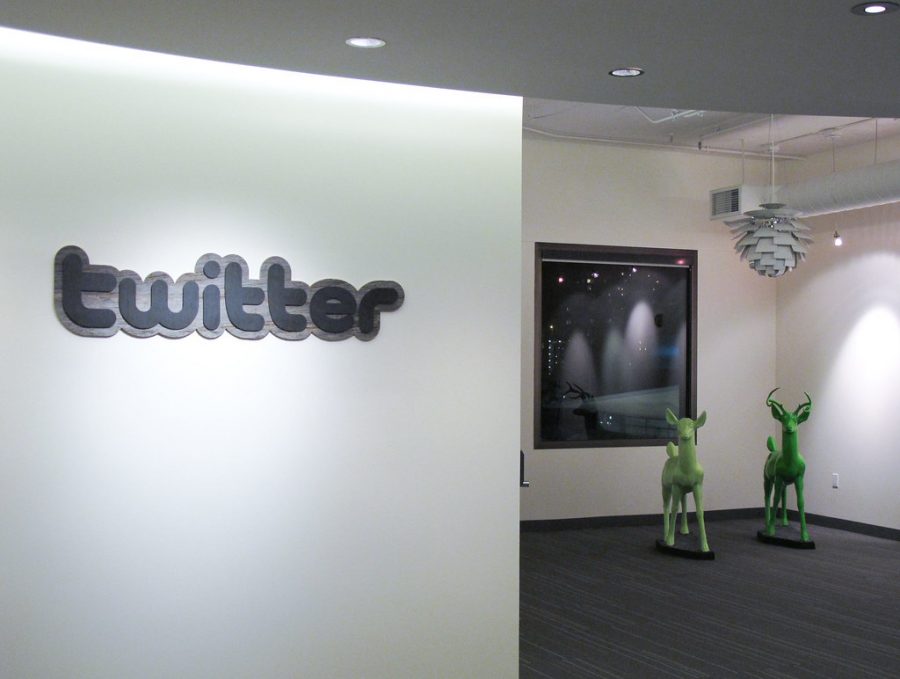Column: Big Tech is officially on their way to establishing an echo chamber
“Twitter Office” by Scott Beale is licensed under CC BY-NC-ND 2.0
Former President Donald J. Trump’s Twitter account was permanently suspended Jan. 8.
February 3, 2021
When Big Tech began censoring former President Donald J. Trump a few months ago, I told people this would cascade into something more disastrous — something more detrimental to democracy at its core. Many did not believe me; they thought it was a far-fetched idea. Yet, here we are in a time of horrendous cancel culture. A time of despicable censorship of those on the right. A time of great despair where Big Tech is trying to destroy and fracture the Republican Party more than it already is.
Twitter CEO Jack Dorsey is at the forefront of this controversy, as Twitter banned Trump indefinitely following the attack on the Capitol. The official reason Twitter removed Trump was because of concerns that he was inciting violence. Twitter specifically targeted two tweets Trump published. Jan. 8, 2021 Trump tweeted, “The 75,000,000 great American Patriots who voted for me, AMERICA FIRST, and MAKE AMERICA GREAT AGAIN, will have a GIANT VOICE long into the future. They will not be disrespected or treated unfairly in any way, shape or form!!” This Tweet was deemed an act of inciting violence according to Twitter. I fail to see how these words incite violence. Trump merely attempted to give his supporters a voice, but this was somehow interpreted as violence. The other tweet Trump published stated: “To all of those who have asked, I will not be going to the Inauguration on January 20th.” Twitter argued that this Tweet gave credibility to the false claims that the 2020 election was not fairly won by President Joe Biden. However, could it just be that there is a lot of animosity between the two politicians? Their grievances started far before election day. If Twitter is going to single out this tweet as words that incited violence, then what about when President Biden mentioned he agreed with Trump’s decision to not come to his inauguration? No one interpreted his support as inciting violence.
Everyone has free will, and the violent radicals who charged the Capitol did so at their own liberty. Trump never told these rioters to incite violence at the Capitol, nor did he lead them into the Capitol. To be clear, those who stormed the Capitol were not peaceful and were unacceptably violent. These actions must be condemned, but it is important to note that there were people among the crowd who were peaceful. The rally itself was intended to be peaceful. Yes, Trump’s words have the power to excite and inspire certain people. Some undoubtedly grew too excited, but he never explicitly told these people to storm the Capitol. “Big protest in D.C. on January 6th. Be there, will be wild!” Trump tweeted in December. He did not use words that seek to incite violence. He simply reached the American people through Twitter to announce a protest. Nowhere did he say anything about violence. In fact, during a speech Trump gave before the protest commenced, he emphasized that the protest was intended to be done “peacefully and patriotically.”
While many argue that the removal of Trump from Twitter is for the greater good of the United States, it is unquestionably damaging to democracy by setting a treacherous precedent. Dorsey even admits the ban is unfortunate, as it limits the promotion of “healthy conversation.” Regardless of whether someone is a Trump supporter, everyone should be concerned about censorship. It’s like an avalanche that creeps upon you, and by the time you realize what’s about to hit you, it’s too late to stop it.
The most frightening part of this entire situation is that the U.S. Constitution does not protect American citizens from this censorship. The First Amendment protects us from U.S. government censorship, but what about private companies? The Constitution was obviously drafted without social media in mind, but it seems like this amendment does not protect us from Big Tech censorship at all. Yes, platforms like Twitter are private companies, and they can do as they please. But it does not make banning Republicans just. It does not make banning Democrats just. It does not make banning anyone just. Big Tech is using its unchecked power as a form of tyranny which, as a result, harms free speech.
So what was the real reason for Twitter’s decision to ban Trump? It seems to be because Twitter targets Republicans who express dissenting opinions that challenge leftist beliefs. It is now seen as acceptable to ban entire platforms such as Parler merely because they give a voice to conservatives. Apple and Google decided to ban Parler from their app stores claiming the app failed to censor posts that may incite violence. I was in for a rather rude awakening a few weeks ago when someone on the internet told me to get off Facebook and stay on Parler. But now I can’t even do that, since the forum was canceled because of closed-minded leaders in Big Tech.
Americans need to wake up and look around. The world is now full of hypocrisy and censorship. The question then becomes: What is next? What ideologies will be acceptable on social media? Which individuals will be banned on what platform? It is only a matter of time before these questions start being asked in earnest, but by then it will be too late.
Madison Boudreau Popovic is a first-year political science and business administration combined major. She can be reached at popovic.m@northeastern.edu.







